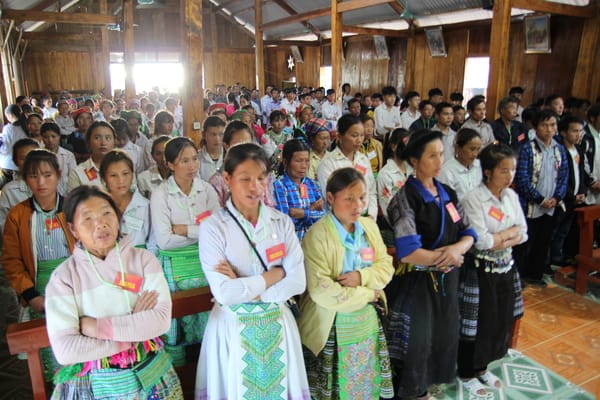Religious leaders and activists in Vietnam have given a mixed response to the U.S. State Department’s inclusion of the country on its Special Watch List for “engaging in or tolerating severe violations of religious freedom.”
Some say it may be enough to force the country to improve its record while others say the decision means little without sanctions and point out that the government is adept at covering up its poor human rights record.
Secretary of State Antony Blinken announced the Southeast Asian nation’s inclusion on Dec. 2, along with Algeria, the Central African Republic and Comoros.
The Special Watch List designation means the U.S. does not consider the four nations’ violations against religious freedom widespread or severe enough to label them Countries of Particular Concern (CPC). However, the State Department will monitor them closely for future inclusion unless it sees an improvement.
Pressure to become officially approved religions
Vietnamese religious groups were placed under the management of the State in 1975 and pressured to join the government-aligned Vietnam Fatherland Front. Those who resisted have seen their religious buildings destroyed and their congregations intimidated and even attacked.
Religious freedom activist Nguyen Van An was a Catholic parishioner in Vietnam’s Nghe An province in Dec. 2018 when a gang of men wearing national flags attacked a group of fellow parishioners who were digging a ditch on land claimed by both their church and local authorities. He is now an exile in Thailand, where he welcomed the U.S. move.
“With the recent record of systematic and continuous repression by the Vietnamese communist government on religions, I think this is the right thing to do and should have been done earlier to force Vietnam to change and limit those repressions,” he said.
An told RFA he thinks the inclusion of Vietnam on the list will force the Communist Party-led government to relax its religious repression to avoid being included in the CPC, which would lead to severe U.S. sanctions against officials — and their families — considered to have carried out such acts.
“Definitely Vietnam will have to change because otherwise it can be included in the CPC at any time,” he said, adding that religious groups and their followers must be willing to document and publicize serious violations.
“Persecuted communities, religious organizations, and human rights defenders need to courageously and forcefully speak up when repression occurs, so that they can quickly alert the international community.”

Independent Buddhist groups targeted
Thich Vinh Phuoc, the abbot of Phuoc Buu Pagoda of the Unified Buddhist Sangha of Vietnam told RFA he found it “very gratifying to see an improvement in the United States’ interest in religious freedom in Vietnam.”
Local authorities in Ba Ria-Vung Tau province demolished his pagoda, along with one other, a guest house and an independent Buddhist retreat in the rural district on the country’s southeast coast. They were trying to convince religious leaders to join the Vietnam Buddhist Sangha – a member of the Vietnam Fatherland Front.
Another member of his independent Buddhist group is not optimistic increased U.S. interest will have any effect on Vietnamese authorities.
Thich Khong Tanh was the abbot of Ho Chi Minh City’s Lien Tri Pagoda, which was demolished by local authorities in 2016. After its destruction he sought refuge in other temples, but said he was still closely monitored, especially at religious events.
Tanh told RFA that when Vietnam wanted to join the World Trade Organization in 2007 the government released some prisoners of conscience in order to be removed from the U.S. list of Countries of Particular Concern but resumed human rights violations after being admitted to the trade group.
“Vietnam is a country that violates religious freedom heavily and continuously. Special attention must be paid because they violate but they cover it up very well,” he said.
Sanctions needed to punish violators
Nguyen Manh Hung, pastor of a Mennonite church offshoot know as the Cow Shed Church, told RFA he was not optimistic about Vietnam’s response to the U.S. State Department’s decision.
“Although I think the U.S. measures are very good, they may not be able to force Vietnam to improve its religious freedom situation,” he said.
“If the United States and other democratic countries only have human rights dialogues with Vietnam without adequate sanctions, I think Vietnam will not change its record of freedom of religion and belief.”
RFA emailed Vietnam’s Ministry of Foreign Affairs and the Government Committee for Religious Affairs to request comment on the U.S. State Department decision but did not receive a reply.
Vietnam’s state-run media has made no mention of the country’s inclusion on the Special Watch List.
Copyright © 1998-2020, RFA. Used with the permission of Radio Free Asia, 2025 M St. NW, Suite 300, Washington DC 20036.